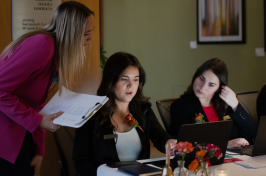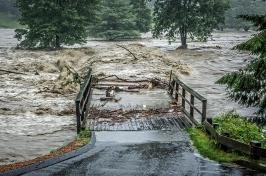
A UNH College of Life Sciences and Agriculture (COLSA) faculty member has been named to United Nations (UN) working group aimed at assessing the state – including the physical, biological, and economic conditions – of the world’s oceans.
Easton White, an assistant professor of biological sciences, joined more than 50 ocean specialists in Lisbon, Portugal, earlier this year to establish a roadmap for creating the UN’s Third World Ocean Assessment (WOA III), which will be released in 2025. The WOA III brings together hundreds of scientists, managers, policymakers and academics from more than 60 countries and various international and regional organizations to assess the state of global oceans across three sustainable development pillars: economic, social and environmental.
"Although we know a lot about what is happening in our oceans, we still lack data and information on important questions. We’re in an exciting time where we can leverage sensors, satellites and statistics to learn about and better manage our oceans."
White will serve as lead author of a new chapter of the WOA focused on human pandemics and their relation to our oceans.
“The world’s oceans are rapidly changing due to climate change and other human-caused drivers, such as marine pollution,” explained White. “During the COVID-19 pandemic, our oceans were affected by pollution from personal protective equipment, like masks, as well as changes to global shipping patterns. We also witnessed seafood workers contracting COVID-19 and decreases in the demand for seafood.”
Different from the previous two assessments, WOA III will detail information, tools and strategies that decisionmakers might use to advance the sustainability, conservation and restoration of our oceans. Additionally, the latest assessment will incorporate the One Health model and the UN’s Sustainable Development Goals.
White, a quantitative marine ecologist, leverages statistics and mathematical tools alongside field studies and experiments to study ecological systems. His research encompasses work within ecological monitoring, sustainable seafood, spatial ecology, extreme weather patterns, and social-ecological dynamics.
White added, “Although we know a lot about what is happening in our oceans, we still lack data and information on important questions. We’re in an exciting time where we can leverage sensors, satellites and statistics to learn about and better manage our oceans.”
-
Written By:
Nicholas Gosling '06 | COLSA/NH Agricultural Experiment Station | nicholas.gosling@yqczg.net




















































